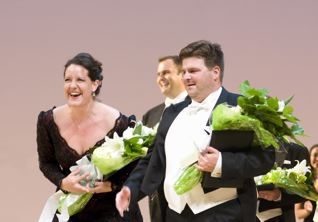Report from Seattle's Wagner Competition
 Imagine that you are a tenor, an aspiring Wagnerian heldentenor. You have entered Seattle Opera’s International Wagner Voice’s Competition and got yourself through to the finals, held on August 16th in McCaw Hall. What else can you possibly sing as your competition aria but Walther’s “Prize Song” from Die Meistersinger? But wait a minute, who is sitting up at the judge’s table in the first tier of the auditorium? Ben Heppner, probably one of the greatest Walthers on the planet. And who is that next to him? Stephen Wadsworth, director of the current Ring Cycle. Oh yes and there’s the managing director of the Berlin Philharmonic, the general director of Bremen Opera and Peter Kazarias, a former Loge. Not to mention a great-granddaughter of Richard Wagner himself, Eva Pasquier-Wagner.
Imagine that you are a tenor, an aspiring Wagnerian heldentenor. You have entered Seattle Opera’s International Wagner Voice’s Competition and got yourself through to the finals, held on August 16th in McCaw Hall. What else can you possibly sing as your competition aria but Walther’s “Prize Song” from Die Meistersinger? But wait a minute, who is sitting up at the judge’s table in the first tier of the auditorium? Ben Heppner, probably one of the greatest Walthers on the planet. And who is that next to him? Stephen Wadsworth, director of the current Ring Cycle. Oh yes and there’s the managing director of the Berlin Philharmonic, the general director of Bremen Opera and Peter Kazarias, a former Loge. Not to mention a great-granddaughter of Richard Wagner himself, Eva Pasquier-Wagner.Sweden’s Michael Weinius faced this daunting prospect but was brave enough to stick to his choice of the Prize Song for his first offering. This writer had some reservations about his performance - he seemed to lack conviction and power - but these were swept away when he sang a heartfelt and herioc “Amfortas, die Wunde” from Parsifal in the second half.
The judges agreed, apparently, awarding Weinius one of the two $15,000 prizes. The other prize went to South African soprano, Elza van den Heever. Until now, Van den Heever had not envisaged a Wagner career; she recently sang Donna Anna in San Francisco’s Don Giovanni. But she impressed the judges with her clear, bright, highly musical renditions of “Dich Teure Halle” from Tannhauser, and “Einsam in truben Tagen,” from Lohengrin.
Before the judge’s decision was announced, both the audience and the orchestra were given a chance to vote too. Seattle’s uber-enthusiast General Director, Speight Jenkins, has created such a comfortable and happy atmosphere in the company, off duty singers often attend other performances. When our audience filed out to the urns in the foyer, I found myself lining up to vote behind the current Seattle Aida, Lisa Daltirus and their Ring’s reigning Wotan, Greer Grimsley. The audience also voted for Elza van den Heever.
The orchestra, whose experience is perhaps the ‘purest’ given that they can’t see any of the contestants, voted for German mezzo-soprano, Nadine Weissmann. Weissmann’s Erda and Waltraute monologue had the requisite exciting rich, dark tones but, at this point in her career, she seemed to lose a little power in longer phrases, failing slightly to deliver on the initial promise.
Seattle’s competition is unique in its focus on Wagner and, in the wise choice to set an age range of 25-39 - given that dramatic singers take longer to mature. By encouraging the careers of young Wagner singers, Seattle Opera, often called “the American Bayreuth” because of its devotion to the German genius, is ensuring its own future.
- Janette Griffiths (Visit Janette's blog)
Photo: Rozarii Lynch
Labels: competition, opera, Richard Wagner, seattle




0 Comments:
Post a Comment
<$I18N$LinksToThisPost>:
Create a Link
<< Home